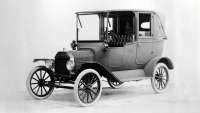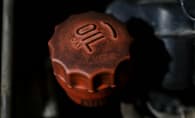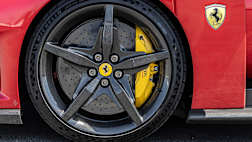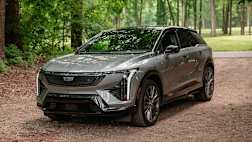You only need to dip a toe into the lava-filled pool of comments that follow any story on the subject to know that the end of local manufacturing has been an emotional time for plenty of Australians.
And it's not just the thousands of men and women who now find themselves out of a job, or the thousands more in supporting industries whose income relied heavily on these companies building cars here that care. You'd need to have a heart forged of pure titanium to not feel for those poor souls.
But it's also the case that Holden and Ford (and to a much lesser extent, Toyota - and to an extent so tiny you can barely even see it, Mitsubishi) are so deeply ingrained in Australia's psyche that we're all feeling the loss.
It doesn't matter if you've never even owned one; it still feels as though an integral part of our nation's tapestry has been crudely removed. And that a large part of the landscape we all look at every day will never look quite the same.
But here's the thing with emotions - as you'll know if you've ever had a good friend who's married someone you can't bear - they blind you to the bleeding obvious.
When your football team loses on the weekend, it's not because they played poorly, it's because the referee was on the take, or because the other side cheated.
When you get sacked, it was because your boss was an asshole, not because you continuously turned up to work a little late and a lot drunk. When you find yourself being served divorce papers, it's never anything you did wrong, is it? (Well, rarely.)
So let's remove the emotion from the equation for a moment and state the obvious once and for all: it was simply no longer viable to build cars in Australia. And it never - ever - will be again.
Could this proud industry have been saved with more government intervention - aka more of our tax dollars? Perhaps. But it wasn't. And it ain't coming back.
Here are the three big reasons why:
A tiny country building big cars
That we hold up balding, text-addict Shane Warne as any kind of national hero proves that we are fiercely patriotic over anything wearing the Green and Gold. So it comes as no surprise that motoring diehards sung from the hills about the fact you could buy a Commodore in the Middle East or in the USA, proving once and for all the engineering know-how and manufacturing ingenuity of Australian carmakers.
But the truth is, almost nobody was buying Australian cars except Australians. The export programs were so small as to be utterly inconsequential.
Between 1994 and 1996, Ford produced more than 192,000 units of its EF Falcon - or an average of 81,000 per annum.
Over the past few years, Holden was exporting an estimated 2000 cars around the world per annum. To put that into some sort of perspective, Hyundai imported more than 28,000 i30s in 2017 alone. Yes, just i30s.
All of which meant it was up to Australia to keep local manufacturing afloat, and we didn't. Between 1994 and 1996, Ford produced more than 192,000 units of its EF Falcon - or an average of 81,000 per annum. By 2015, sales had shrunk to less than 6,000 units.
Toyota had squeezed more success out of its export program, sure. But in the end we were left with expensive-to-build cars that we didn't want to buy. And neither did anyone else.
It's not just automotive manufacturing
The decline of manufacturing in Australia is nothing new, we're just guilty of not paying enough attention to it.
There are currently an estimated 900,000 manufacturing jobs across Australia, which sounds like a healthy enough industry. Until you consider that, just a couple of decades ago, there were 1.6 million.
Demographer Bernard Salt blames the "globalisation of manufacturing", or, in other words, learning that it was cheaper to build things overseas and ship them back than to pay Australians to build them here.
That, coupled with the changing nature of Australia's workforce, means the bell is tolling for all levels of mass manufacturing here.
It's a bit like those Japanese water garden features where they slowly drip, drip, drip, and all of a sudden the fulcrum shifts.
"This is the vice of the globalisation of manufacturing," says demographer Bernard Salt. "We've outsourced stuff to China, and then we import it back through the ports.
"But we have created jobs and opportunity elsewhere. Certainly in education, certainly in health, certainly in construction. In some respects we are bringing Australian workers out from the drudgery of repetitive factory work, and we're cultivating jobs... in the knowledge industries.
"This transition has been underway for perhaps 20 years. It's a bit like those Japanese water garden features where they slowly drip, drip, drip, and all of a sudden the fulcrum shifts.
"I think the fulcrum shifted in the car-making business in 2017. But the reason for that has been the small drips that have been taking place over the last decade and a half."
It costs too much to build cars here
Let's not get bogged down in the government assistance thing. It's true that the Australian taxpayer gifted Holden around $1.8bn, Ford around $1.1bn and Toyota around $1.2bn over 10 years or so. But just about every other government subsidises automakers in every other car-producing country on the planet, and Australia's assistance numbers, in some respects, were actually quite modest by comparison.
The real killer blow was the cost of building cars here. A 2013 analysis by The Conversation found that the cost of building a car in Australia was four times that of Asia and double that of Europe, and that's before you take into account the cost of shipping cars from Australia to a world that is very far away indeed.
That ship has sailed, or rather that Falcodore has driven off into the sunset.
Now, I know what you're going to say; companies like Performax and HSV will be converting cars from left- to right-hand drive in Australia, how come they can do it? Simple. They're importing finished cars, moving the steering wheel, and then charging an exorbitant price for doing so.
And that's all we have left to look forward to. The economic conditions are not going to change, factory workers in Thailand aren't about to become less competitive and no government in its right mind will ever subsidise a local car industry again, because to do so would be burning money.
That ship has sailed, or rather that Falcodore has driven off into the sunset.





.jpg)
.jpg)

.jpg)


.jpg)

.jpg)


.jpg)



.jpg)






